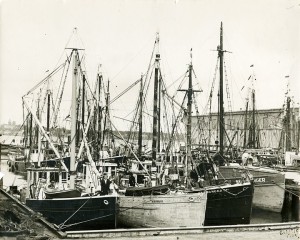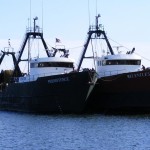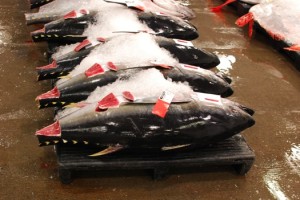Tag Archives: Brian J. Rothschild

‘Where have all the cod gone?’ and the sustainability imperative – By Brian J. Rothschild
In “Where Have All the Cod Gone” (New York Times, Jan. 2) history professor W. Jeffrey Bolster claims that the “..recent ban on cod fishing in the Gulf of Maine (GOM) was an important step toward restoration.” ,,,But Bolster’s analysis is an oversimplification and a misunderstanding of this important conservation issue. And in a broader sense, it is symptomatic of how we misunderstand and oversimplify our conservation and sustainability issues, and how this limits our ability to develop efficient and cost-effective solutions. Read the rest here 18:03
Guest View: Cause for optimism at NEFMC meeting
![]() Thank you for the report on the Center for Sustainable Fisheries’ proposal that the New England Fisheries Management Council and National Marine Fisheries Service implement an intensive, industry-based, collaborative sampling program focusing on increasing data collection and reducing stock-assessment uncertainty (“Fishery council declines yellowtail proposal,” April 26). Read more here 07:16
Thank you for the report on the Center for Sustainable Fisheries’ proposal that the New England Fisheries Management Council and National Marine Fisheries Service implement an intensive, industry-based, collaborative sampling program focusing on increasing data collection and reducing stock-assessment uncertainty (“Fishery council declines yellowtail proposal,” April 26). Read more here 07:16
Evaluating Effectiveness of Fish Stock Rebuilding Plans In the United States by Brian J. Rothschild and Kate Kramer
![]() Recently the National Research Council (“NRC”) published a report of a study about the effectiveness of fish stock rebuilding plans in the United States. A basic thrust of the report is that fishery management plans are administrated in a prescriptive and formulaic manner without regard to the scientific “facts.” The report suggests that a more flexible approach would result in more efficient management. The problems with the prescriptive and formulaic approach are exemplified in the reports discussion of the ten-year rebuilding mandate. It is clear that the drafters of the report are thinking of a scientific approach that is alternate to the current approach. We ask, does the approach advocated by the NRC of the National Academy of Science become the best science available? more@centerforsustainablefisheries
Recently the National Research Council (“NRC”) published a report of a study about the effectiveness of fish stock rebuilding plans in the United States. A basic thrust of the report is that fishery management plans are administrated in a prescriptive and formulaic manner without regard to the scientific “facts.” The report suggests that a more flexible approach would result in more efficient management. The problems with the prescriptive and formulaic approach are exemplified in the reports discussion of the ten-year rebuilding mandate. It is clear that the drafters of the report are thinking of a scientific approach that is alternate to the current approach. We ask, does the approach advocated by the NRC of the National Academy of Science become the best science available? more@centerforsustainablefisheries
Guest View: The end of “overfishing”? By Dr.Brian J. Rothschild (new england trusted)
Brian J. Rothschild is the Montgomery Charter professor of Marine Science and Technology at the UMass Dartmouth School for Marine Science and Technology.
The necessity of imposing the cuts is not clear. The council’s scientific committee has had difficulties reaching consensus on the management of key stocks. The Council is faced with a dilemma. If the stocks are down and the cuts are necessary, how do we mitigate the impact of the cuts on the people who work in the fishing industry and fishing communities, and then how do we plan for the future? At the same time, if the stocks are not down and the cuts are not necessary, how do we promote stability within the fishing industry and fishing communities, and then how do we plan for the future?
To understand the council’s short- and long-range plans on how to deal with its dilemma is crucial, particularly since the condition of the groundfish stocks may not be as bad as it seems. Read More
















































